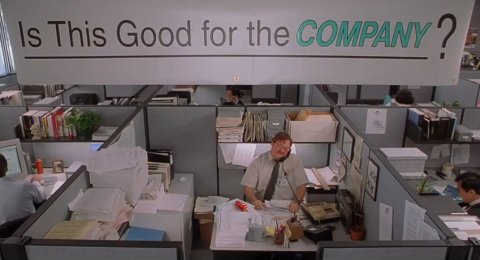My boyfriend was filling out paperwork for his horrible, soul-sucking new job—which is, in fact, his horrible, soul-sucking old job, four years later—and one of the questions they asked was, “How long do you plan to keep this job?” One of the options was three to five years, and one was more than five years.
Everyone I’ve told that to who knows anything about the company knows that there are only two real possibilities—”until you fire me” and “until something better comes along.” My boyfriend worked there previously for eight years, and he didn’t plan to. It’s just that he was able to avoid getting fired and the economy had tanked. Then, he quit to go back to school full time, and while the economy picked up some while he was in school, it didn’t pick up enough for him to find something better in a timely fashion. So there he is again; they’re always hiring.
What does this have to do with movies? I’m glad you asked. Probably half or more of the best-known movies actually about work involve people who hate their jobs. Oh, sure, Office Space. But you know, Norma Rae doesn’t much like her job, either, but it’s the job she can get. At least she has a chance to make the job better. Doris Walker from Miracle on 34th Street loves hers, but I think she’s a minority. I haven’t crunched the numbers, because that’s a lot of numbers to crunch, but “work comedy about people who hate their jobs” is its own genre.
We are a nation, in the US, completely saturated with popular culture. We breathe it. We are filled with references to movies, TV shows, and even popular books. I know people who don’t own televisions, haven’t in years, and can still quote The Simpsons. We know popular culture better than we know our history, certainly. Whether we are shaped by it or it shapes us is not an argument I choose to have here, especially since I think the answer is “yes,” but the point remains that we are more likely to know the name of the mayor on The Simpsons than our own hometowns. I don’t know who is currently mayor of mine.
So why can’t employers recognize the fact that most people work because they have to? We’ve dealt with a ton of job applications in the last seven or eight months around here, and they all expect you to want the job because of the job, not because it would be awfully nice to eat and to sleep indoors. (And the sad fact is that quite a lot of jobs still don’t pay enough for you to do that.) “Tell us why you want this job.” But they know—I suspect half the people writing applications don’t like their jobs, either.
It’s a strange blind spot, and I think it’s deliberate. It makes sense to me when filmmakers get things wrong about what it’s like to have a regular job; a lot of them haven’t had a regular job as we think of one in years, if ever. Why should they? They can make a living in movies, and quite a lot of people would rather do that than be Generic Office Drone #3—I, for one, would rather play Generic Office Drone #3 than actually be one.
However, I think most employers have to believe that their company is different. They’re the fun place to work, never mind that the “fun” place to work in Office Space is Chotchkie’s, which we know to be awful. Though actually, one of the only examples I know of where a company learned something from that movie is the “flair” thing. It isn’t required at TGI Friday’s anymore.
So yes, there seems to be this belief that no one wants to work at the other jobs out there, but this job, this one job, is the one where everyone would work if they had the chance. Though I think the lesson of Office Space is that there is no one place where everyone would work if they had the chance, and most people are afraid to go looking for it anyway. Better a mindless, soul-sucking job than no job at all.

